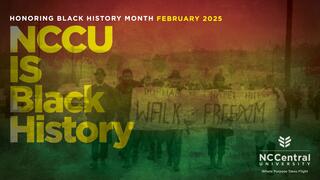In fall 2023, ten students from North Carolina Central University (NCCU) interviewed five alumna who have pursued social justice in some form including civil rights, legal justice, education equity, gender equity and LGBTQ rights.
The interviews were for a course titled, "Digital Archival Research in Women's History," which originated with Rachelle Gold, Ph.D., professor of English.
“I have been teaching a women and gender studies class for the last six years,” Gold said. “In 2022, I found this clip of Malcolm X giving a speech in 1962. He said the most disrespected person in America is the Black woman and the most unprotected person in America in the Black woman.”
That semester, Gold’s class was reading the work of Latina, Asian, Native and African American women. “They (wrote) they still felt invisible and unheard,” Gold said.
Not long after, Gold ran across a request for proposals for social justice in higher education from the Mellon Foundation. She applied and received a $500,000 grant, “the largest grant in the humanities and arts that the university has ever received.”
It’s not your typical class.
Instead of just registering online, prospective students must have a high grade point average, apply by writing four paragraph essay along with signing a commitment to miss no more than two classes and attend every field trip.
Once accepted, the ten students received training in public speaking, videography and photography. Two graduate students from the Southern Oral History Project at UNC at Chapel Hill taught them oral history interviewing skills. The class also visited the Center for Civil Rights in Greensboro.
With the help of university archivist Andre' Vann, the students identified subjects and found yearbook photos and other archival documents.
Gold persuaded the Mellon Foundation to allow students to be paid $1,600 for their preparation and work.
“I’ve never had a class with a stipend before,” said Fatoumata Balde, a senior in political science who is minoring in woman and gender studies. Balde said she applied for the course because she is a woman, a gender studies minor “and I really love research.”
Balde and her class partner Dyazia Johnson interviewed Jocelyn Wright an attorney who formerly worked in the special victims unit, felony prosecution, for Alamance County and now works as special deputy attorney general for the North Carolina Department of Justice.
They interviewed Wright at Farris-Newton Communications building. While Balde had interviewed political candidate in the past while in the student government association and NAACP, she was a little worried.
“I have a problem with getting nervous and speaking really fast,” Balde said.
The interview went well, however, with Wright answering all the questions “openly, honestly and elaborately,” she said.
These interviews, which will become part of digital archive, will be publicly available and searchable. The goal is 60 interviews by 120 students over the next four years.
“I think it’s important to document how Black women have struggled, for women today who don’t know how these struggles were overcome or how to combat those them in today’s societies,” Balde said.
Elena Kendrick, a senior majoring in history with a minor in women and gender studies, interviewed Amber Esters, a public health educator and LGBTQ rights activist.
“Courses like this are absolutely necessary,” Kendrick said. “It bridges a gap between students and the working population. It’s crucial to interview those who worked as activists and those who do grass roots work that may not be recognized.”



